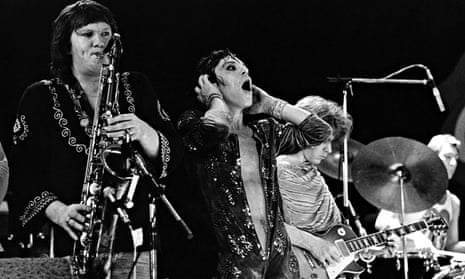The saxophonist Bobby Keys, who has died aged 70, played with a remarkable list of rock’n’roll greats including Buddy Holly, Eric Clapton, John Lennon, George Harrison, Carly Simon, Lynyrd Skynyrd and Warren Zevon. Most of all he will be remembered as a regular collaborator with the Rolling Stones, whom he first met when they toured the US in 1964.
Keys performed with the Stones on numerous tours and on all their major albums, beginning with Let It Bleed (1969), and was on stage with them at their Glastonbury performance last year. His saxophone solos on Brown Sugar and Can’t You Hear Me Knocking (on the album Sticky Fingers, 1971) were the most celebrated of his many recorded performances with them, but in both sound and attitude, Keys became an embodiment of the band’s hedonistic spirit.
Keys was part of the Stones entourage on the Côte d’Azur in the early 1970s, and was an integral part of the famously debauched Exile on Main Street recording sessions. Keith Richards recalled that the song Happy was recorded by just himself and Keys, with the producer Jimmy Miller on drums. Keys was in his element. “Yessir, buddy! The south of France, pretty girls, a young man in his 20s, a rock’n’roll musician, that’s a mighty good combination,” he said, as he put it, adding that, “there were whisky bottles around, there were scantily clad women around. It was rock’n’roll, son.” During this time Keys had an affair with Nathalie Delon, estranged wife of the French actor Alain Delon.
Keys was born at Lubbock army airfield in Hurlwood, Texas, coincidentally on the same day in 1943 that Richards was born in England. Keys’s father, Bill, was in the US army air force. When Bill and his teenage wife, Lucy, moved to New Mexico, Bobby stayed in Slaton, Texas, with his grandparents. He saw Lubbock-born rock’n’roller Buddy Holly play when he was 10, which inspired him to take up music. In his teens he played briefly with Holly.
By the early 60s, he was touring with the pop singer Bobby Vee on Dick Clark’s Caravan of Stars, alongside such artists as Little Eva and Major Lance. He was playing with Vee when he first met the Rolling Stones at the San Antonio state fair in Texas. In his autobiography Life, Richards remembered the meeting and described Keys as “my closest pal (we were born within hours of each other). A soul of rock and roll, a solid man, also a depraved maniac.” For his part, Keys confessed to being dubious about the Stones recording Buddy Holly’s Not Fade Away, but then concluded that “the band was really, really good, and they did Not Fade Away actually better than Buddy ever did it”.
In the late 60s Keys joined Joe Cocker’s Mad Dogs & Englishmen tour (and appears in the subsequent concert film) and toured with Delaney & Bonnie in a band that also included Clapton and Harrison. Keys renewed his association with the Stones when they were recording Let It Bleed, and he was summoned to play a solo on Live With Me. He and the trumpeter Jim Price also featured on the hit single Honky Tonk Women. In December 1969 he recorded his famous solo on Brown Sugar, though the song wasn’t released until two years later.
Having played on Clapton’s first solo album and Harrison’s solo debut, All Things Must Pass (both 1970 releases), Keys recorded the 1972 instrumental solo album Bobby Keys (featuring Clapton, Harrison and Ringo Starr), and worked steadily with the Stones until the outlandish lifestyle got the better of him during their 1973 European tour.
Richards discovered him in a bath full of Dom Perignon champagne along with “this French chick” when he should have been preparing for that night’s concert. This angered Mick Jagger so much that Keys – who also sought treatment for heroin addiction around this time – was virtually written out of the Stones’ subsequent 70s tours, though he returned for 1982’s European shows and was fully restored for the Steel Wheels campaign in 1989.
When not with the Stones, Keys sometimes played club gigs under the pseudonym of Mr Brown Sugar, and released the solo album Gimme the Key in 1975. He became part of Lennon’s entourage during his “lost weekend” separation from Yoko. He played on Lennon’s albums Walls and Bridges – which generated the US chart-topper Whatever Gets You Through the Night, featuring a memorable Keys performance – and Rock’n’Roll. He also appeared on the bootleg-only album A Toot and a Snore in 1974, supposedly the only recordings to feature Lennon and Paul McCartney together after the Beatles split.
In 1979 Keys was part of Stones guitarist Ronnie Wood’s band The New Barbarians, who toured the US and supported Led Zeppelin at the Knebworth festival, and he also appeared with Richards’s band X-Pensive Winos at their intermittent appearances in the 80s and 90s. In the late 80s Keys was music director for Wood’s Miami club, Woody’s on the Beach. Lately he had been fronting his own band, the Suffering Bastards, comprising former members of bands such as the Black Crowes and the Georgia Satellites.
In 2012 he published his autobiography, Every Night’s a Saturday Night. Keys’s last performance with the Stones was at the Roskilde festival in Denmark in July, as part of the 14 On Fire tour. He dropped out of the tour’s Australia and New Zealand dates last month for undisclosed health reasons.
According to Michael Webb, keyboard player with the Suffering Bastards, he had been suffering from cirrhosis of the liver. He is survived by his wife, Holly, and son, Jesse.

Comments (…)
Sign in or create your Guardian account to join the discussion